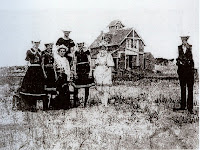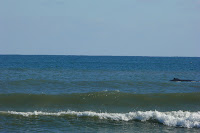A few days ago a reader posed several questions, each of which is worthy of a blog entry. I will answer them one question at a time.
Here is question #1: "What are your earliest memories of the island?"
As many of our readers know, my father, Lawton Howard (1911-2002), left Ocracoke when he was 16 years old, and, like most young island men of that era, moved to Philadelphia to work. There he met and married my mother. Every summer we came back "home" to Ocracoke.
My earliest memories include taking the 4 hour trip across Pamlico Sound on the mailboat Aleta. This was, of course, before there was any ferry service to the island. You can only imagine the excitement and anticipation of this genuine adventure.
In those early days Ocracoke had only one single-lane paved, concrete, road. It ran from the old Navy base (where the NPS Visitors Center is located today), turned where the Anchorage Inn is now, turned again before the road to the British Cemetery, turned again at the present-day Coffee Co., then "T"ed at the end, and terminated in short aprons where the Navy dumped spent ammunition (hence the local name for the final, long section of the road, "Ammunition Dump Road"). The rest of the village lanes and paths were mostly deep, soft sand. I loved to run barefoot all over the village.
When I was a teenager my friends and I wandered around the village until late at night. When I came back home my feet were filfthy. Too tired to wash my feet before climbing into bed, I'd simply pull on my socks...then wash in the morning.
Every Saturday night we had square dances. In my days they were held in the school recreation hall (one of the abandoned WWII buildings that was moved to the school property -- where the gymnasium is today; the building was moved again in the 1970s, and is now Jimmy's Buffet restaurant). Oh what fun we had at those dances! Everyone was there...spirits were high...Ocracoke girls were cute...and there was always homemade meal wine somewhere.
In those days there were still numerous skeletons of wrecked schooners and other sailing vessels that had been tossed upon the beach. When I was a child I loved to climb on them and imagine the sailors and pirates who played such a prominent role in Ocracoke's history.
Of course, in the evenings visiting my grandparents, aunts, uncles, and cousins was an important part of island life. The older folks told so many stories, and laughed so easily. During the day I'd wander down to the docks and watch the boats bring in fish, turtles, and other seafood. The old men sat on benches with white sailor's caps, barefooted with their pants rolled up, smoking cigarettes, drinking Pepsi Colas, and carving small birds.
Sometimes at night my buddies and I would wade out into the sound with our Coleman lanterns and flounder gigs. What a wonderful feeling it was to return home late at night, exhausted, carrying a mess of fresh flounder for our next day's dinner.
Horses, of course, made a visit to Ocracoke even more exciting. Before the mid 1950s the semi-wild ponies often found their way into the village. We'd see them around the harbor, or walking down Howard Street. My mother always filled a large galvanized tub so they'd have something to quench their thirst in the hot summer months. My Uncle Marvin was the leader of the mounted Boy Scout troop, so he always had a horse nearby. Another scout leader once sent him an Indian headdress. I can still see him riding through the village with that headdress, having a grand old time.
Well, there you have a few of my early memories of Ocracoke. I can't think of a better way to to have spent a childhood summer!
Our latest Ocracoke Newsletter is a list of traditional island remedied. You can read it here: http://www.villagecraftsmen.com/news.htm.





















